May 2025: Too broke to pay tax? Methanex pays $70 million dividend to Canadian owner
Via Newsroom: A big multinational’s Kiwi subsidiary has claimed to be unprofitable and paid no tax in New Zealand for the last two years – yet found the cash to pay a $70 million dividend to its Vancouver-based parent company this year.
The dividend is disclosed in a note to this month’s Methanex NZ financial statements, along with paying down $91m in debt to its Asia-Pacific sister company. That’s prompting accusations it’s “moving significant volumes of capital out of the country”.
The big climate polluter has received an estimated $300m worth of emissions trading scheme government subsidies over the last 10 years, to stop it moving overseas. Yet, at a time when gas shortages have been crippling local manufacturers, the overseas-owned Methanex consumes up to 45 percent of New Zealand’s natural gas every year.
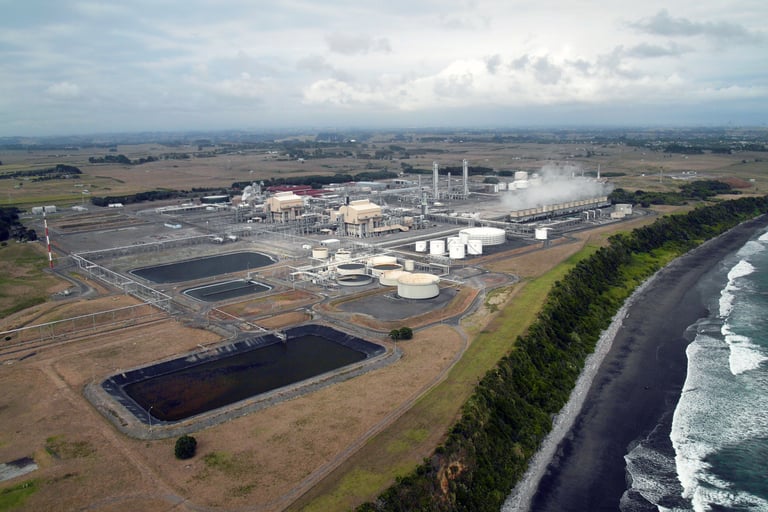

Methanex's Motonui plant in Taranaki. Photo: Fiona Clarke
May 2025: Climate Minister blocked a review of free carbon credits
Via RNZ Morning Report: Ministers rejected advice to take a hard look at hundreds of millions of dollars in climate grants to the likes of NZ Steel, Methanex, Rio Tinto, and Fletcher Building.
Inland Revenue and Treasury told the government there was no proper evidence that yearly subsidies to some of the country's biggest carbon polluters were needed.
Their recommendation for a thorough review was met with a no thanks from Minister Simon Watts.
"The fact that the Minister blocked this is disappointing," said Alex Johnston of the Don't Subsidise Pollution campaign.
"It's raising the question of whether this is an expensive system that's inconsistent with our carbon targets, but might not actually be based on any evidence of real risk."
The free carbon credits were meant to be a transitional measure to shield firms from unfair competition from countries without carbon prices and climate targets.
The scheme mainly benefits five firms deemed to be exposed to trade competition: Methanex, Fletcher Building, the Tiwai Point smelter, Ballance, and NZ Steel, which is owned by Bluescope.
Together, these producers of methanol, concrete, aluminium, fertiliser and steel receive hundreds of millions of dollars a year in the form of free carbon credits, which the government could otherwise sell.
Inland Revenue and Treasury said a review might show a cheaper scheme would achieve the object, meaning the government could re-allocate some of that money to other priorities.
The subsidies were meant to be a transitional measure, running from 2010-2030, but they have been extended.
At the current rate of phaseout - of 1 percent a year, rising to 3 percent in the 2040s - the government could still be subsiding heavy emitters in 2060.
That is despite the government having a goal of being carbon neutral in 2050.
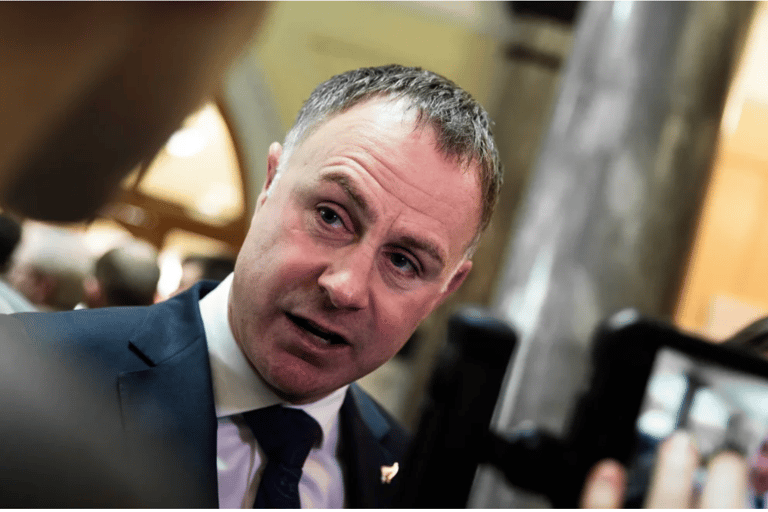

Climate Change Minister Simon Watts. Photo: RNZ / Samuel Rillstone
March 2025: Government doubles pollution subsidy to one of our largest contributors to climate change
In the same week that household power bills are going up without any mitigation from government, we were frustrated to hear that the government is forking out $35 million/year to subsidise a multinational's power bill to allow them to keep polluting.
A decision by the Climate Change Minister Simon Watts will see the carbon subsidy to the Rio Tinto-owned Tiwai Point Aluminium Smelter double to $75 million / year by adding free carbon credits to cover the carbon cost of the smelter's electricity use. The smelter produces annual climate pollution equivalent to about 250,000 petrol cars.
Speaking to Newsroom about the government's decision, Common Grace Aotearoa co- director and Don't Subsidise Pollution campaign spokesperson, Alex Johnston highlighted how the Minister's overruling of officials' advice added at least $300 million to the power subsidy over the life of the smelter's electricity contract.
We believe there's a better way to secure jobs than massive subsidies to keep polluting. With the right type of government support, the technology is there for industries like steel, concrete and aluminium to decarbonise and take responsibility for their pollution while growing good, green jobs in our regions
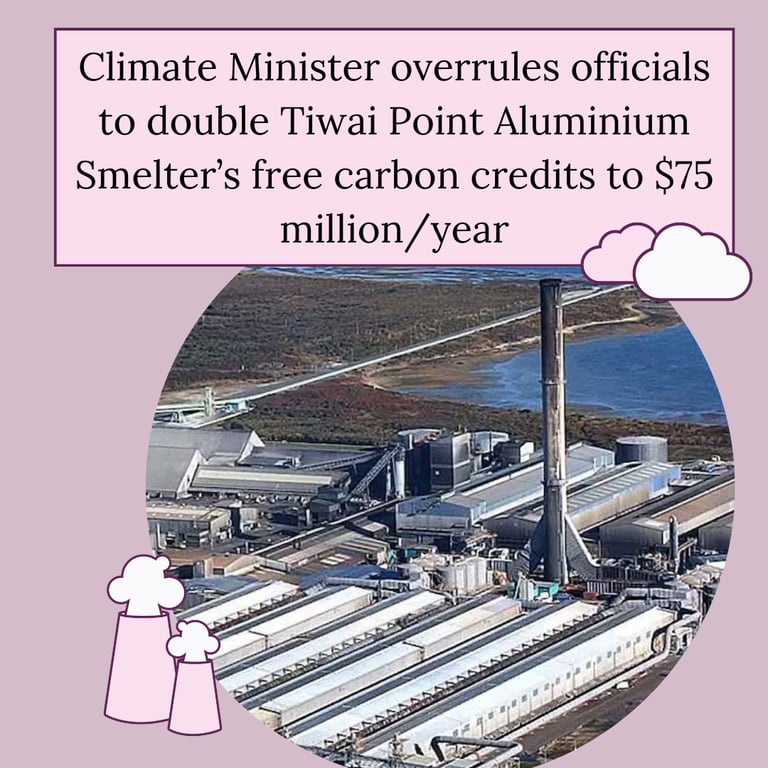

February 2025: Climate Commission backs a review of free carbon credits
The Climate Change Commission released evidence in February that it submitted to the Environment Select Committee on our campaign's petition to end free carbon credits.
the independent body pointed to serious problems with the subsidy scheme, after MPs asked it to comment on a 6000-signature petition before Parliament.
Via RNZ: The commission's reply said: "The petitioner has raised a number of valid policy issues with how industrial allocation operates. We see merit in investigating other approaches that could be more conducive to meeting the 2050 target and come at lower cost to taxpayers."
The commission's reply - dated December but only released on in February - said the design of the scheme weakened the incentive for companies to reduce planet-heating emissions, and was misaligned with the country's climate targets.
It recommended the government look at other, less expensive ways to fight what is called emissions leakage - the problem when production of carbon-intensive goods shifts to countries with low or no emissions penalties.
The commission said "hybrid options" might also be effective.
In response to the Commission's evidence, Alex Johnston, spokesperson for the Don't Subsidise Pollution campaign said:
"It’s very encouraging to see the Climate Commission’s considered evidence calling for a review into the system of free carbon credits. Subsidising big polluters to the tune of hundreds of millions of dollars a year doesn't make sense, and now the independent experts have set the record straight.
Thousands of people across Aotearoa who signed this petition are upset that we are continuing with this outdated system during a climate and cost of living crisis.
Removing free credits and replacing them with targeted investments to support trade-exposed industries to decarbonise, alongside a Carbon Border Adjustment Mechanism could achieve much greater and more certain emissions reductions while supporting green industrial revolution and a just transition in many of our regions."
New report warns against subsidising possible gas price hikes
A dry winter in 2025 or beyond could enable our largest gas user – Canadian company Methanex – to push up gas and electricity prices, according to a new report, titled “Methanexit: should NZ be subsidising our largest gas user?”
The report – released by 350 Aotearoa, Common Grace Aotearoa and the Centre for International Corporate Tax Accountability and Research (CICTAR) – argues that tightening gas supplies and declining production margins are increasingly shifting Methanex’s business model from methanol production to gas on-selling, at a significant mark-up.
Here are some key findings of the report:
The report highlights that Methanex’s Taranaki plant is 34% more polluting than the company’s global production, and yet our government is propping up their pollution with free carbon credits.
Last year Methanex received $60 million worth of free carbon credits from the government to subsidise their pollution, which they can sell to cover their profit margin. We estimate Methanex's free carbon credits over the last decade add up to about $300 million.
As the profitability of producing methanol has declined, the subsidies it receives and its massive gas contracts enables it to speculate on gas prices. This year when the dams were running low and power prices were high, the company was able to on-sell their gas for an estimated 400% markup to electricity retailers.
And when it comes time to pay tax, conveniently a lot of their profit is shifted on to their Hong Kong based owner. Our report reveals they have engaged in activities could have had the effect of reducing income tax expense by more than $46 million over the last decade.
December 2024: Methanexit: Should NZ be subsidising our largest gas user?
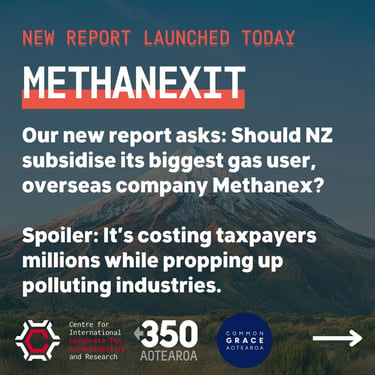

December 2024: Reaction to the Second Emissions Reduction Plan
Don’t Subsidise Pollution campaign spokesperson Alex Johnston, of Common Grace Aotearoa, comments on the Government’s Second Emissions Reduction Plan finalised today:
"It's disappointing that the plan doesn't address the massive subsidy we give to multinationals through free carbon credits so they can continue carbon-intensive business as usual.
Policies in the Emissions Budget 2 period are expected to only achieve 3.2 million tonnes of emissions reduction, while the government in that time plans to give away 28 million emissions units for free via industrial allocation.
"The Climate Change Commission and other experts agree that changes to industrial allocation in the ETS are urgently needed. Such a huge subsidy props up multinationals’ production processes whose emissions account for nearly 10% of the country's emissions. While the rest of NZ must reduce emissions to meet our reduction goals, these companies are largely exempt at a huge cost to ordinary households."
“The Plan also ignores the fact that over half of submitters called on the government to deal with the problem of free carbon credits to industrial polluters.”
Policies in the Emissions Budget 2 period are expected to only achieve 3.2 million tonnes of emissions reduction, while the government in that time plans to give away 28 million emissions units for free via industrial allocation.
In an email to submitters, the Ministry reported that there were 1800 submissions, and the Don’t Subsidise Pollution campaign was responsible for 962 submissions from individuals.
Said Johnston: “Removing free credits and replacing them with targeted investments to support trade-exposed industries to decarbonise could achieve much greater and more certain emissions reductions than relying on speculative carbon capture technology.
“The ERP stresses the need to create investment certainty. But because these free allocations are so costly to NZ and do not align with our climate targets, it is inevitable that significant changes will need to be made down the road. The ERP creates the illusion that it is possible to continue business as usual, when it will in fact expose investors and businesses to shock adjustments later.”
“The better approach would be for the government to show leadership and commit to phase out the free credits by 2030 and introduce a Carbon Border Adjustment Mechanism. It should develop a range of policies to support these businesses to decarbonise rather than subsidising business as usual at the expense of taxpayers and the planet.”
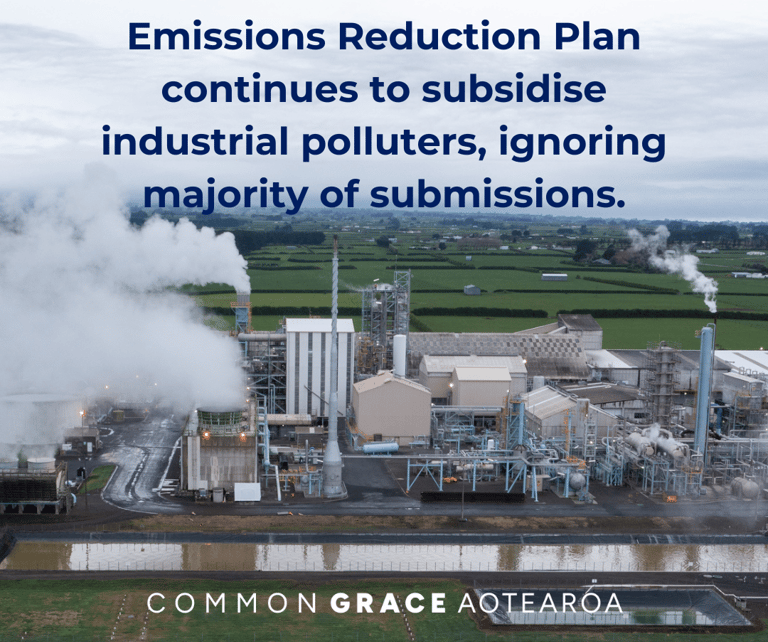

We celebrate the inclusion of an end to free carbon credits and embrace of a Carbon Border Adjustment Mechanism in He Ara Anamata - the Green's Party alternative Emission Reduction Plan announced on Sunday, and invite other political parties to follow suit with their own ideas for how to stop subsidising the pollution of large industrial emitters.
The proposed Ministry of Green Works to facilitate a just transition presents a strong opportunity to unlock a green industrial transformation in Aotearoa where no one is left behind.
Our Don't Subsidise Pollution campaign - with a petition signed by thousands and hundreds making submissions on the government's draft Emissions Reduction Plan - has been calling for an end to free carbon credits and policies to unlock green jobs in Aotearoa's industrial sectors, and now these ideas are really starting to stick!
09 December 2024: Green Party supports ending free carbon credits and a Carbon Border Adjustment Mechanism
For more detail, download our full policy briefing provided to MPs in July 2024 - Reforming industrial allocation: How ending free carbon credits can cut emissions and unlock green jobs in New Zealand’s industrial sectors
Image credits:
"Ras Laffan LNG Terminal, Qatar" by Matthew Smith, CC BY 2.0


